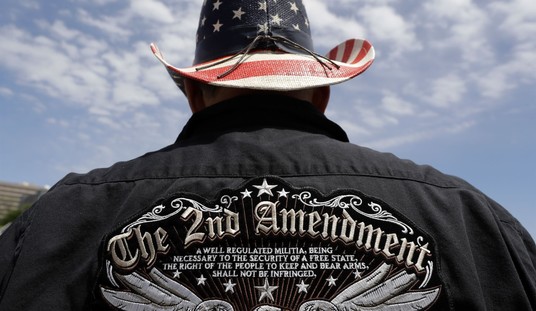As regular readers—and other sentient beings—know, the “Constitution State,” the state of Connecticut, has recently passed a law outlawing firearms and accessories—particularly magazines with greater than ten rounds capacity—that were previously entirely unremarkable and lawful. This law, and the potential for the deadly abuse of law-abiding citizens in the enforcement of it, have greatly concerned Americans. I’ve played some small part in informing that concern with a series of articles beginning with: “Connecticut: The Coming Storm.”
Connecticut’s law seems prima facie unconstitutional in that it is arguably a direct assault on the Second Amendment. It essentially outlaws an entire class of firearm, which is made more egregious by the fact that the class—AR-15 type rifles—is the most popular in contemporary America. The Supreme Court’s Heller decision noted that firearms usually and commonly in use are not subject to bans. The fate of magazine capacity limits is not quite so clear, but surely at some point, restricting the number of cartridges available to free men in defense of themselves, their families, their state and their nation must run afoul of the Second Amendment.
After all, if ten rounds—a number picked at random by anti-freedom advocates—is a good thing, why not limit magazines to only six, or even one? Fortunately, the nation has ample experience with such things. The Clinton gun ban, which also banned similar rifles and limited magazines to ten rounds, was in effect for a decade. It accomplished nothing—nothing at all—for public safety. Even its most ardent proponents were forced to admit this, and Democrats, smarting from the self-imposed political slaughter it wrought amongst them, quietly allowed the law to sunset. [note: a new study suggests that murder rates was 19.3% higher during the federal ban. -ed.]
What then is the argument for the same, failed law? That it will make Democrats and the uninformed feel good? That it will make a “nicer” society? “We’re the government and we can do whatever we want, nyah, nyah, nyah!?”
Obviously, under strict scrutiny, which is likely the standard by which the Supreme Court will judge substantial Second Amendment issues in the future, this sort of law shouldn’t have a leg to stand on. But there is another, even more obvious and compelling reason why such laws should not be written, and once written, must fall: they are ex post facto laws.
The Cornell Legal Information Institute defines Ex Post Facto as:
Latin for ‘from a thing done afterward.’ Ex post facto is most typically used to refer to a criminal law that applies retroactively, thereby criminalizing conduct that was legal when originally performed. Two clauses in the US Constitution prohibit ex post facto laws: Art 1, § 9 and Art. 1 § 10. see, e.g. Collins v. Youngblood, 497 US 37 (1990) and California Dep’t of Corrections v. Morales, 514 US 499 (1995).
So seriously did the Founders take this issue that ex post facto laws are twice explicitly prohibited in the Constitution, first in Article I, Section 9, Clause 3:
No Bill of Attainder or ex post facto Law shall be passed.
And in Article I, Section 10, Clause 1:
No State shall enter into any Treaty, Alliance, or Confederation; grant Letters of Marque and Reprisal; coin Money; emit Bills of Credit; make any Thing but gold and silver Coin a Tender in Payment of Debts; pass any Bill of Attainder, ex post facto Law, or Law impairing the Obligation of Contracts, or grant any Title of Nobility.
Put simply, an ex post facto law makes what was not a crime on Monday a crime on Tuesday. It is one of the most abused techniques of tyranny, allowing a despot to retroactively criminalize anything and anyone for conduct that was entirely legal when it was done. How can one obey the law when they can have no idea what is legal and what is not? How can one avoid prosecution when any lawful thing they do at any moment might be criminalized at any time in the future?
For any law to be valid-constitutional–it must be specific and the average person must be able to understand what is allowed and what is not. That which is not specifically prohibited is allowed. This is where ex post facto laws are the antithesis of the Constitution and the rule of law. The law-abiding man or woman buys an AR-15 rifle and standard 30 round magazines in good faith in December of 2013. Under the existing law, they are entirely legal and utterly unremarkable. In fact, they are allowed because they are not specifically prohibited. But a month later, the rifle and magazines are suddenly outlawed and their law-abiding owners, potential felons. Their choice is registering the weapons and magazines—inexpensive bits of metal and plastic without serial numbers or any other means to positively identify them—or disobeying tyranny. This is the situation in Connecticut.
Herigage.org provides a good basic primer on ex post facto law. Among its essential points:
Nevertheless, opposition to ex post facto laws was a bedrock principle among the Framers. In The Federalist No. 78, Alexander Hamilton noted that ‘the subjecting of men to punishment for things which, when they were done, were breaches of no law’ is among “the favorite and most formidable instruments of tyranny.” Thomas Jefferson noted in an 1813 letter to Isaac McPherson ‘the sentiment that ex post facto laws are against natural right.
Another essential principle is the ex post facto laws primarily—perhaps exclusively—refer to criminal, not civil laws:
The Court addressed the issue of the scope of the clause in one of its earliest constitutional decisions. Calder v. Bull, decided in 1798, involved a determination by the Connecticut legislature that a judicial decree should be set aside and a new trial held regarding a contested will. Without dissent, the Court held that the Connecticut legislature’s action was not an ex post facto law forbidden under Article I, Section 10. Justice Samuel Chase defined ex post facto laws as:
1st. Every law that makes an action done before the passing of the law, and which was innocent when done, criminal; and punishes such action. 2d. Every law that aggravates a crime, or makes it greater than it was, when committed. 3d. Every law that changes the punishment, and inflicts a greater punishment, than the law annexed to the crime, when committed. 4th. Every law that alters the legal rules of evidence, and receives less, or different testimony, than the law required at the time of the commission of the offence, in order to convict the offender. All these, and similar laws, are manifestly unjust and oppressive.
Clearly, Connecticut’s law is an ex post facto law. It is a criminal statute prescribing criminal penalties. Indeed, the penalty for mere possession of a prohibited firearm is a felony with a mandatory minimum year in prison.
This would seem an obvious avenue for those seeking to roll back Connecticut’s oppressive laws. It will be interesting to see if, and when, it is used.
Mike’s Home blog is Stately McDaniel Manor.









Join the conversation as a VIP Member